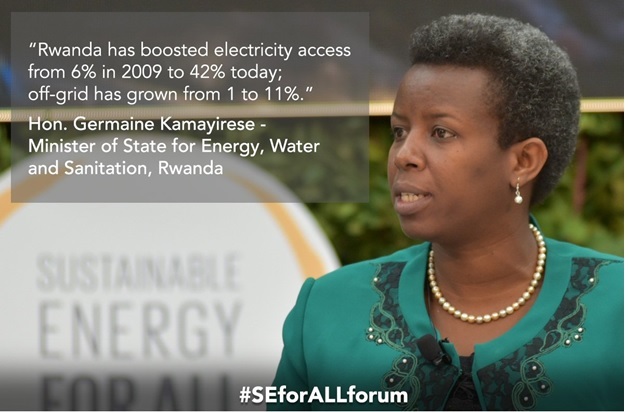Lisbon, Portugal, 2-3 May, 2018: Minister of State, Hon. Germaine Kamayirese attended the fourth Sustainable Energy for All Forum that was hosted by Sustainable Energy For All (SEforALL) at the Convento do Beato in Lisbon.
The 2018 Forum themed, “Leaving No One Behind”, brought together more than 750 leaders from government, business, civil society and international organizations was aiming at assessing the latest data towards progress on Sustainable Development Goal 7.
The forum focused on sharing the latest evidence of scalable innovations in providing electricity access, accelerating renewable energy and improving energy efficiency in all corners of the world. It shined a spotlight on the urgency for bringing affordable, reliable, sustainable and modern energy to under-served populations, communities and regions that are at risk of being left behind in the global clean energy transition. Participants to the Forum noted that these populations are especially vulnerable to energy poverty, climate impacts and other extreme economic challenges; yet they also lack a voice, finance and political capacity for changing their situation.
A highlight was the launch of the 2018 Global Tracking Framework report, which benchmarks annual progress towards achieving universal access to modern energy services, doubling renewable energy and improving energy efficiency by 2030.
In this perspective, Minister of State participated in a panel discussion that focused on data that Drives SDG 7: Emerging Findings from the Global Energy Access Survey. This Partner Working Session hosted by the World Bank was used to release new survey evidence on patterns of energy access in Cambodia, Ethiopia and Rwanda. These are the first completed country reports to emerge from the application of the Multi-Tier Framework (MTF); an innovative methodology that makes it possible to measure access to electricity and cooking in a much more meaningful way than was previously possible, and in particular to capture the dimensions of affordability and reliability emphasized by SDG7.
The panel discussed how this enhanced availability of data can be used to design more effective strategies to expand energy access.
Hon. Germaine Kamayirese showcased how Rwanda boosted electricity access. Minister Kamayirese responded to practical use of Multi-year framework approach to accelerate access to electricity and clean cooking and policy actions to achieve Sustainable Development Goals.
“Rwanda has boosted electricity access from 6% in 2009 to 42% today; off-grid has grown from 1% to 11%”; said Minister Kamayirese. During the Ministerial panel discussion on "Policy Matters" on SDG 7 challenges, Hon. Kamayirese said “Rwanda plans to use 48% off grid and 52% grid energy by 2024”.
The MTF approach was designed by the SE4ALL knowledge hub and adopted and being tracked by the World Bank – ESMAP which captures the quantitative and qualitative aspects of energy access, provided by different technologies and fuels. This approach was developed with the aim of providing policy-makers with a more focused understanding of the countries’ energy access situation and policy choices are taken to improve access to energy services (both electricity and cooking).
The Government of Rwanda through the support of the World Bank in November 2016 conducted the Multi-Tier Framework survey. The results of this survey which will be published were also adopted in the National Household Survey conducted by the National Institute of Statistics and the results are expected December 2018.

 ENGL
ENGL KINY
KINY